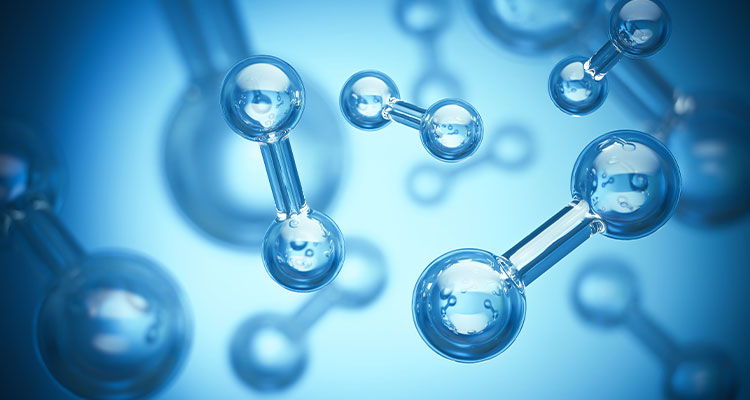
Greg Harris poses the question: Why hydrogen and fuel cells?
Let’s start with the basic assumption that climate change is real and already happening, and the world needs to stop producing CO2 to avoid a climate crisis. Add in that to save lives in our busy cities, we need to stop the production of harmful pollution such as NOx. That means the engine technology that we have used for more than a century and is still used today in most motive applications (and many stationary applications) must change.
Of course, this change is already taking place, and in the UK and most developed countries, the use of batteries to power cars, electric buses and many other areas continues to increase year-on-year. If the electricity that is used is green, then there is no CO2 or other pollution created during use of that vehicle.

So, the obvious questions are, why isn’t all focus on battery powered vehicles and batteries to replace engines in all other use cases, and why isn’t the uptake of batteries for these applications moving faster? From a technical point of view, the biggest issue is the relatively low energy density of today’s batteries – they are too heavy and take up too much space to meet the longer distance and heavier payload requirements of larger vehicles. The slow speed to re-charge batteries (even ultra-fast charging takes tens of minutes) compounds the energy density issue. Other issues which are slowing the pace of battery uptake are the cost per kWh, the relatively short life before replacement, challenges in (economic) recycling, safety, and supply chain issues (where all the materials come from and how much is available).
These challenges with batteries have kept the door open for alternatives, however the options for commercially available zero-emission alternatives are limited. Hydrogen fuel cells provide one of the most well-developed alternatives and address many of the issues with batteries.
Hydrogen as a fuel and a mechanism for transporting energy has very significant potential as an alternative to storing energy in batteries. Unlike burning diesel, petrol or natural gas, combustion of hydrogen produces no CO2. However, when burnt it still produces low levels of pollutants (such as NOx) and is also inefficient in converting fuel to energy, typically below 40 percent efficiency. The alternative is to convert the energy directly from hydrogen to electricity using an electrochemical process, which is what a fuel cell does.
As the energy in hydrogen is stored either as a gas or liquid, it has a much higher energy density than batteries. In practical terms, this means that for the same system mass or volume, a fuel cell and hydrogen can deliver up to three times the range achievable with batteries. This is particularly advantageous for heavier vehicles or those wanting a longer range, where just adding a bigger battery is not an option. In applications such as flight, batteries are not a practical option and a higher power density technology like hydrogen and fuel cells is really needed.
Hydrogen vehicles can also be refueled in the same way as petrol or diesel vehicles and only take slightly longer to fill up. This is beneficial when looking at the level of infrastructure to support zero emission vehicles, as one hydrogen refueling station can support ten times more vehicles than a battery charging station. It’s true that it’s more practical to charge battery vehicles at home or work, than it is to refuel with hydrogen, but the limitations on electrical grid capacity will restrict that ability as more battery vehicles are deployed. 
Today the cost of fuel cells is higher than batteries, but if similar volumes are produced in the future, then fuel cells can be more cost effective, as the cost of materials and processing should be lower. Fuel cells also don’t require the same volume of exotic materials as batteries, as they only use a small amount of platinum, and they don’t have the same issues around recycling, as around 95 percent of the material can be recycled. Fuel cells also offer a longer life than batteries – a typical automotive battery would have an operational life of around 8000hrs, where fuel cells today already achieve double that life and even then, only the stack needs replacing with other components achieving even longer life.
The safety of using hydrogen as a fuel is also something that is often questioned. In fact, hydrogen has been widely used in industry for decades and the safety standards for the fuel are well developed. The fuel cells themselves, as well as the rest of the hydrogen system, are designed to a high safety level with multiple sensors to defect faults or leaks and automatic shutdown if any issues are detected.
In summary, hydrogen fuel cells provide a practical option to replace technology that pollutes, with operational benefits over batteries and potential to be more cost effective when produced in volume.
Greg Harris
Greg Harris is CCO at Intelligent Energy, a leader in the development and manufacture of cutting-edge hydrogen fuel cells that overcome the limitations of conventional battery-powered systems. The privately-owned company, which has 600 patents in place, has been innovating for more than two decades in the automotive, aerospace, power generation, telecoms, materials handling and unmanned aerial vehicle (UAV) sectors.